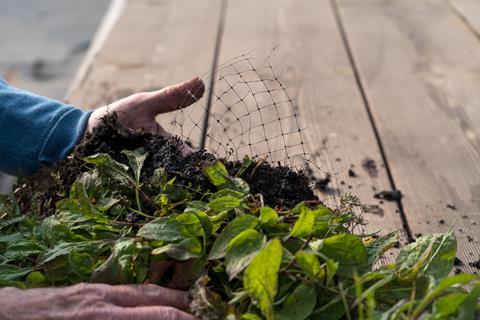The majority of UK turf growers use some kind of plastic turf netting in some or all of their products, leading to soil pollution and possible water contamination

Lindum Turf has called for the industry to end the use of plastic netting in turf, something it claims causes unseen environmental damage.
The Yorkshire-based turf grower described the plastic netting - which is in the majority of turf sold in the UK - as an avoidable source of pollution, adding that many British consumers are unaware of its presence in the product.
Lindum Turf has reported a threefold increase in sales of its plastic-free wildflower turf over the past two years as the desire to replace manicured lawns with wildflower meadows increases.
For those specifying wildflower turf to increase biodiversity and attract pollinators to gardens, it could come as a shock to discover the product they are laying could be causing more harm to the environment.
Stephen Fell, owner of Lindum Turf, said: “Over time the plastic netting breaks down into microplastics and pollutes the soil. But because the net is hidden within the turf and people can’t see it, they don’t know it is there. So, despite people having the best intentions of doing the right thing for the environment, they often don’t realise the damage choosing the wrong product can cause.
“It’s a throwback to earlier production methods the industry likes to keep quiet about. But technology has moved on. We have worked hard for many years to eliminate plastic from our turf, including our wildflower turf, and we believe it is now time for the rest of the industry to catch up.”
For those specifying wildflower turf to increase biodiversity and attract pollinators to gardens, it could come as a shock to discover the product they are laying could be causing more harm to the environment.
One argument employed by some turf growers is to describe the plastic as “degradable”. But this often confuses consumers into thinking the plastic mesh used is biodegradable and therefore harmless to the environment.
The Turf Growers Association (TGA) has supported the call, encouraging its members to go plastic-free by 2025. According to the organisation, the vast majority of UK turf growers use some kind of plastic turf netting in some or all of their products.
Richard Owen, chairman of the TGA, said: “It is very difficult to quantify exactly how much turf is laid in the UK, but it is likely that a significant amount of plastic turf netting is being put into the ground each year. This causes problems for wildlife, for farmers on whose land the turf is grown, and most seriously, it decays into polluting microplastics that can leach into watercourses and get into the food chain.”
The view that single use plastics should not be in turf is also shared by Chelsea Flower Show organiser the Royal Horticulture Society, who is working to reduce the use of three materials at its shows: concrete, virgin timber and plastics. Having already banned plastic bags and floral foam across the shows, they are also aiming for the complete removal of single use plastics by 2025.
















No comments yet